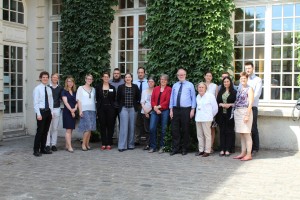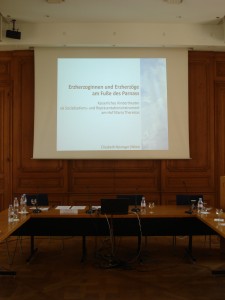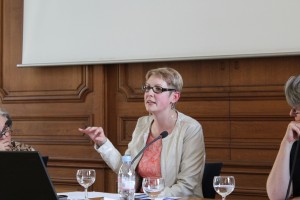Elisabeth Reisinger presented one chapter of her dissertation at a summer school, organised by Vanina Kopp and Pascal Firges, at the Institut historique allemand Paris (June 23th-26th 2015), that is also represented on the web by a blog (in French and German). The participants of this workshop, entitled “Jeux et enjeux de pouvoir à l’époque prémoderne”, discussed political and social aspects of games and festivities in premodern courtly societies as well as forms of ‘games’ of political power and diplomacy.

Participants of the summerschool 2015/DHI Paris (left to right: Pascal Firges, Stephan Mai, Claudia Hefter, Elisabeth Reisinger, Constanze Buyken, Guillaume Bureaux, Vanina Kopp, Nicola Bergamo, Elisabeth Lalou, Caroline zum Kolk, Rolf Große, Anne Marle Kolle, Tiphaine Mardinier, Jean-Daniel Mougeot, Francesca Aceto, Birgit Studt, Jean-Dominique Delle Luche)
The opening evening as well as the mornings started with essential papers: on historical anthropology in France (Jean-Claude Schmitt, EHESS), structures of French-German research (Pierre Monnet, Institut français d’histoire en Allemagne) and the history of research about courts in France (Caroline zum Kolk, Cour de France.fr). The sections were accompanied and commentated by high-ranking French-German researchers such as Pierre Monnet, Caroline zum Kolk, Birgit Studt, Fanny Cosandey, Rolf Große and Elisabeth Lalou.
In her presentation, “Erzherzoginnen and Erzherzöge am Fuße des Parnass/Archduchesses and Archdukes at the foot of Mount Parnass”, Elisabeth discussed the social and political meanings of musical activities of the Habsburg family in the 2nd half of the 18th century and how they changed in these decades, focusing on the example of an opera (Il parnaso confuso by Metastasio & Gluck) and a ballett (Le triomphe de l’amour by Hilverding & Gassmann) performed in 1765 on the occasion of the 2nd wedding of Joseph [II] by his younger siblings. The inspiring exchange with historians from France and Germany helped to develop some new perspectives on several aspects such as the diverse roles of courtly festivities, mechanisms and strategies of representation, as well as questions of gender.



0 Comments
Would you like to share your thoughts?